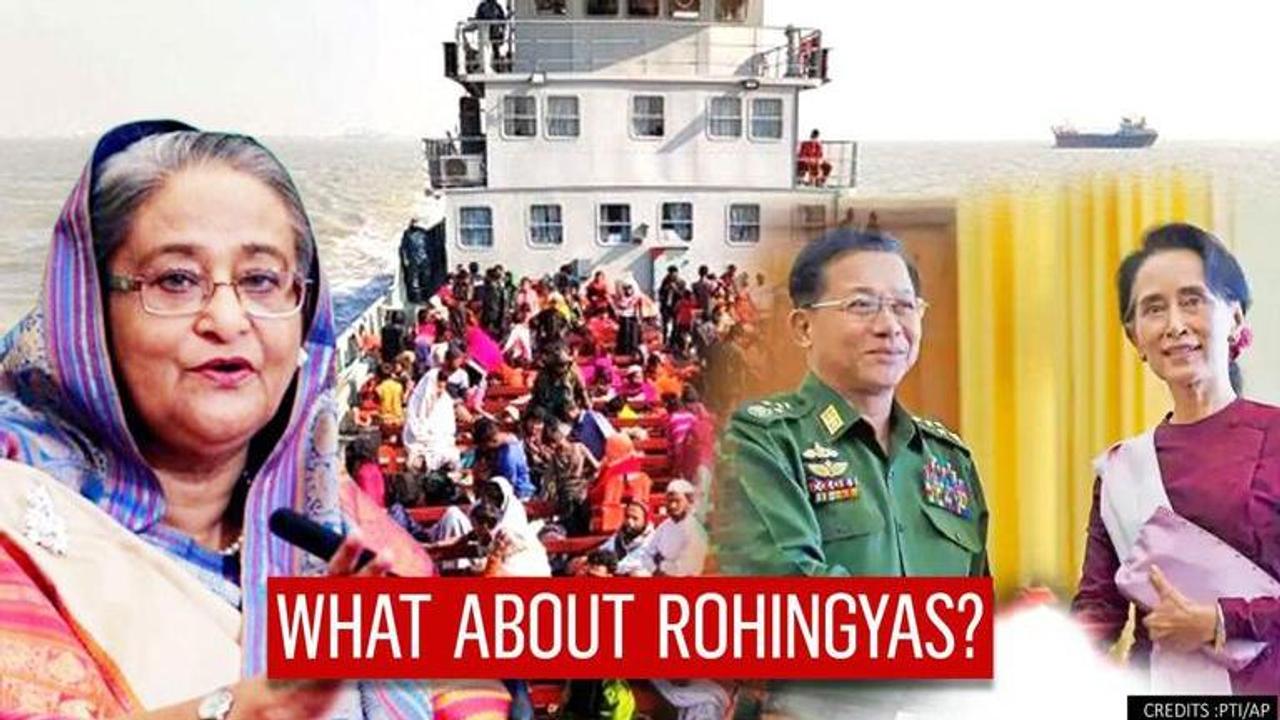Published 08:50 IST, February 2nd 2021
Bangladesh condemns Myanmar military coup, urges 'Rohingya repatriation should continue'
Bangladesh has condemned the military coup in Myanmar but Sheikh Hasina-led country has urged that process of repatriation of Rohingya refugees to continue
- World News
- 4 min read

As the de-facto ruler Myanmar - Aung San Suu Kyi, President U Win Myint and other senior officials were detained by the military, thus staging a coup, neighbouring Bangladesh on Monday has condemned the action. An official statement issued by the Ministry of Foreign Affairs stated, "Bangladesh firmly adheres to and promotes democratic ethos. We hope that the democratic process and constitutional arrangements will be upheld in Myanmar. As an immediate and friendly neighbour, we would like to see peace and stability in Myanmar."
After detaining the leaders, Myanmar military declared a state of emergency in the country for one year, and currently, the state power has been handed over to Commander-in-Chief of Defense Services Min Aung Hlaing, while Myanmar's first Vice-President Myint Swe will serve as the acting president of the country. This assumes significance as Min Aung Hlaing is accused of plotting the army’s offensive against Rohingyas in 2017, with the United States even imposing sanctions on the Commander-in-Chief in 2019.
Bangladesh's statement about Rohingyas repatriation
Though, Bangladesh in its statement, has urged that the process of repatriation of the refugees to continue, it seems unlikely considering the given situation. "We have been persistent in developing mutually beneficial relations with Myanmar and have been working with Myanmar for the voluntary, safe and sustained repatriation of the Rohingyas sheltered in Bangladesh. We expect these processes to continue in right earnest," the statement added.
Bangladesh is currently relocating the Rohingyas in the refugee camps of Cox’s Bazar to Bhasan Char, an island specifically developed to accommodate 100,000 of the 1 million Rohingya. The flood-prone island is located 21 miles (34 kilometres) from the mainland, surfaced only 20 years ago and was not previously inhabited. Bangladesh has said that ultimately it is up to Myanmar to take the refugees back and has called on the international community to put pressure on Myanmar's government to ensure their safe return.
In December 2020, Bangladesh’s Foreign Secretary Masud Bin Momen said after a tripartite meeting between both countries, facilitated by China, said that Myanmar has agreed for repatriation in the second quarter of the year. The Myanmar foreign ministry had then said, “Myanmar has made all necessary arrangements for the repatriation and reaffirmed Myanmar’s readiness to receive the verified displaced persons in line with the bilateral agreements."
However, in the present context, with Suu Kyi and other leaders detained, it remains to be seen what unfolds for the Rohingya refugees in Bangladesh.
Who are Rohingyas?
Rohingyas are an ethnic minority in Myanmar residing in the Rakhine state of Myanmar. While most of the Rohingyas are Muslims, very few are also Hindus. The Buddhist majority nation of Myanmar claims that Rohingyas are residents of Bangladesh. The Rohingyas trace their origin to the fifteenth century the Arakan Kingdom. However, they say that many others settled in the now Rakhine state in the nineteenth and twentieth-century under the colonial regime.
The Buddhist majority government in Myanmar denied citizenship to the Rohingyas in 1962 even as they recognised 135 official ethnic groups in Myanmar. Moreover, they do not recognise the term 'Rohingya' and call them "illegal migrants" from Bangladesh. Other diplomatic affairs experts say that Rohingyas gave themselves the term for a distinct political identity during the 1950s, and the word loosely means "from Arakan."
The military in Myanmar has confined the Rohingyas in Rakhine state and nearby areas. They are stripped off fundamental rights and are allegedly persecuted by military. In revolt of military's persecution, a number of militant organisations have risen in the area, one of them being the Arakan Rohingya Salvation Army (ARSA). In August 2017, the Arakan Rohingya Salvation Army (ARSA) claimed responsibility of attacking police and army posts, prompting action from the Myanmar army, which declared ARSA as a terrorist organisation and started a brutal campaign in Rakhine state, burning their houses, forcing almost seven hundred thousand Rohingya to leave the country and fled to neighbouring Bangladesh, India and Malaysia. As the Rohingyas crisis unfolded in 2017, the UN had called it "a textbook example of ethnic cleansing." Later in 2020, the International Court of Justice ordered Myanmar to take all measures to prevent the genocide of Rohingya Muslims.
Updated 08:50 IST, February 2nd 2021
